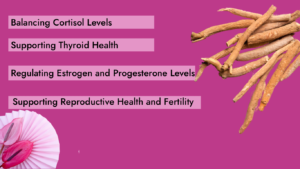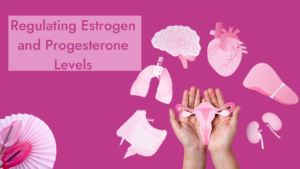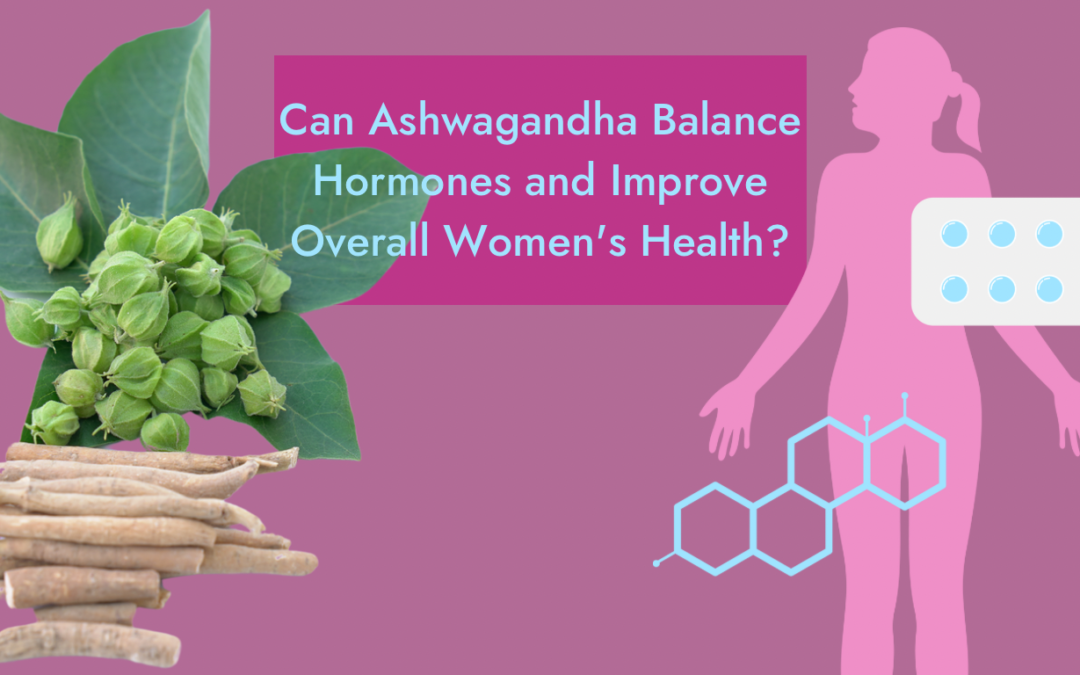Ashwagandha, an adaptogenic herb revered in traditional Ayurvedic medicine, has been gaining popularity in the wellness community for its potential to reduce stress, improve energy, and enhance mental clarity. While many people associate this herb with stress relief, recent studies and anecdotal evidence suggest that Ashwagandha can play a significant role in balancing hormones and improving overall women’s health.
In this blog, we’ll explore how Ashwagandha works within the body, particularly in relation to hormone regulation, and why it might be a powerful ally for women dealing with hormone imbalances, menstrual issues, and other health concerns.
What is Ashwagandha?
Ashwagandha (Withania somnifera) is an herb native to India, traditionally used as a powerful adaptogen to help the body adapt to stress. As an adaptogen, it helps to regulate the body’s stress response by modulating cortisol, the hormone released during times of stress.
However, the benefits of Ashwagandha go beyond stress reduction. It’s also linked to improved energy levels, enhanced immune function, and better cognitive performance.
While it’s primarily known for its ability to manage stress and anxiety, Ashwagandha’s influence on hormonal health, particularly in women, is becoming a growing area of interest.
Ashwagandha and Hormonal Balance in Women

Hormonal imbalances can manifest in many ways, including irregular periods, mood swings, fatigue, weight gain, and even fertility issues. Hormones such as cortisol, thyroid hormones, estrogen, and progesterone play crucial roles in regulating the body’s various systems.
An imbalance in any of these hormones can lead to a cascade of health problems. Ashwagandha’s adaptogenic properties make it a natural candidate to support hormonal regulation, particularly for women.
1. Balancing Cortisol Levels

Cortisol is known as the “stress hormone,” and when levels remain elevated due to chronic stress, it can wreak havoc on your body. Long-term elevated cortisol levels can lead to weight gain, poor sleep, low libido, mood swings, and even thyroid dysfunction. One of Ashwagandha’s most well-documented benefits is its ability to reduce cortisol levels in the body.
Several studies have shown that Ashwagandha supplementation can significantly lower cortisol levels, promoting a sense of calm and relaxation.
By reducing cortisol, Ashwagandha may indirectly help regulate other hormones, such as progesterone and estrogen, which are often affected by chronic stress.
2. Supporting Thyroid Health

The thyroid is a small but powerful gland that regulates metabolism, energy production, and mood. Many women experience thyroid-related issues, such as hypothyroidism or hyperthyroidism, which can cause fatigue, weight fluctuations, hair loss, and mood disturbances.
Ashwagandha has been shown to support healthy thyroid function. Research suggests that it may help normalize thyroid hormone levels, particularly in individuals with hypothyroidism.
A 2018 study found that Ashwagandha supplementation could significantly increase the levels of thyroid hormones (T3 and T4) in people with low thyroid function, promoting better metabolic balance.
3. Regulating Estrogen and Progesterone Levels

Estrogen and progesterone are two key hormones involved in the menstrual cycle, fertility, and pregnancy. A delicate balance between these hormones is required for menstrual regularity, healthy fertility, and overall well-being.
Hormonal fluctuations or imbalances in estrogen and progesterone can result in conditions like polycystic ovary syndrome (PCOS), endometriosis, fibroids, and premenstrual syndrome (PMS).
Ashwagandha may help maintain the balance of these reproductive hormones by supporting the body’s endocrine system. Some studies suggest that Ashwagandha can influence estrogen and progesterone levels, which may help with symptoms of PMS and improve menstrual regularity.
By reducing stress and promoting overall well-being, Ashwagandha may also improve mood and alleviate some of the emotional symptoms associated with hormonal imbalances.
4. Supporting Reproductive Health and Fertility

Hormonal imbalances can significantly affect fertility, especially when issues like high cortisol levels or thyroid dysfunction are involved. Ashwagandha’s ability to regulate these hormones may help support reproductive health in women who are trying to conceive.
In particular, Ashwagandha may help by reducing cortisol’s negative impact on the ovaries and improving the overall hormonal environment necessary for conception.
Some studies have even explored Ashwagandha’s role in improving sperm quality in men, but its potential benefits for female fertility are still under research.
Other Benefits of Ashwagandha for Women’s Health
In addition to its hormonal-balancing effects, Ashwagandha offers a wide range of benefits that may improve women’s overall health and wellness:
1. Improved Mental Health
Hormonal imbalances often lead to mood swings, anxiety, and depression. Ashwagandha’s adaptogenic properties help regulate the stress response, promoting a sense of calm and relaxation.
It may be beneficial for women suffering from mood swings, anxiety, or even more severe conditions like generalized anxiety disorder (GAD) or depression. In clinical studies, Ashwagandha has been shown to significantly reduce symptoms of anxiety and improve overall mood.
2. Improved Sleep
Ashwagandha can improve sleep quality by reducing stress and anxiety, both of which can contribute to insomnia. For women dealing with hormonal imbalances, especially those in perimenopause or menopause, insomnia is a common issue.
Ashwagandha’s ability to calm the nervous system can help promote more restful sleep, which in turn can improve hormonal health and overall well-being.
You can also read : ( https://www.healthyposhan.com/blog/ashwagandha-for-sleep-natural-remedies-for-insomnia )
3. Reduced Inflammation and Antioxidant Properties
Chronic inflammation is linked to many health issues, including hormone imbalances, autoimmune diseases, and metabolic disorders. Ashwagandha has potent anti-inflammatory and antioxidant properties, which can help reduce oxidative stress in the body.
By supporting the body’s natural defense mechanisms, Ashwagandha may improve overall health and reduce the risk of chronic conditions that can affect hormonal balance.
How to Incorporate Ashwagandha into Your Routine
If you’re considering adding Ashwagandha to your daily routine to support hormone balance, there are several options available. It’s important to note that the optimal dosage and form may vary depending on individual needs, so consulting with a healthcare provider before starting any supplement is always a good idea.
- Capsules or Tablets: Ashwagandha is widely available in capsule or tablet form, typically containing 300-500 mg of the extract. Most studies use this dosage for effective stress reduction and hormone balancing.
- Powdered Form: Ashwagandha powder can be mixed into smoothies, warm drinks, or milk. This is a traditional way of consuming the herb in Ayurvedic practices.
- Tea: Ashwagandha is also available as a tea, providing a soothing way to integrate it into your routine.
- Tincture or Liquid Extract: If you prefer a more concentrated form, liquid extracts or tinctures are another option.
Conclusion
Ashwagandha has long been recognized for its ability to reduce stress and enhance overall well-being. However, its potential to balance hormones and improve women’s health is equally impressive. By reducing cortisol levels, supporting thyroid function, and potentially regulating estrogen and progesterone, Ashwagandha can be a powerful tool in addressing hormone imbalances, improving fertility, and alleviating common symptoms associated with menstruation and menopause.
While more research is needed to fully understand Ashwagandha’s role in women’s health, the existing evidence suggests it could be a valuable addition to your health regimen. As with any supplement, it’s important to consult with a healthcare provider to determine if Ashwagandha is right for you and to ensure it complements your specific health needs.
If you’re looking for a natural way to support your hormones and overall health, Ashwagandha may be worth considering—an ancient herb with modern benefits for today’s women.

